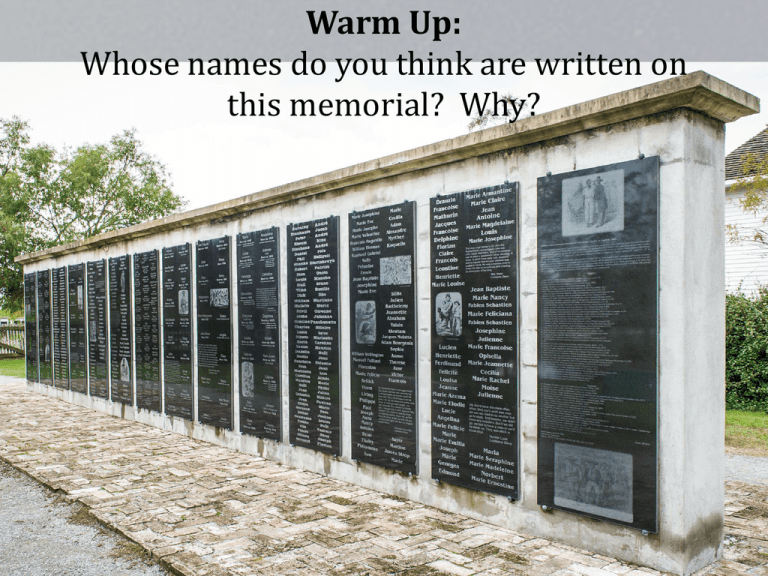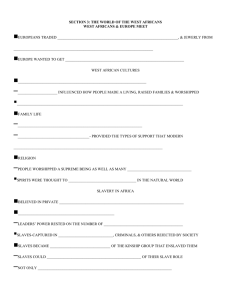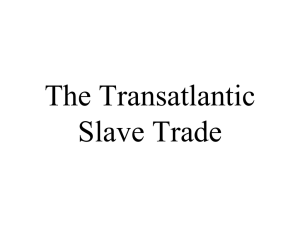Warm Up: Whose names do you think are written on
advertisement

Warm Up: Whose names do you think are written on this memorial? Why? Today’s Questions: What was life like for an enslaved African on a southern plantation? Agenda: 1. Notes/discussion: slave life 2. Reader’s theater: Underground Railroad 3. Underground Railroad Storyboard Before the Civil War, the majority of slaved worked on __________ in the Deep South. Slave auctions Enslaved Africans were viewed as ____________. At slave auctions, Africans were ___________ and __________to slave owners. Many families were ________ _________ on the auction block. Description of a slave auction: “On a signal given, at the beat of a drum, the buyers rush at once into the yard where the slaves are confined, and make choice of that parcel they like best. In this manner…relations and friends are separated, most of them never to see each other again.” --Olaudah Equiano Living conditions Slaves were treated differently depending on __________ they lived and _________ their master was. Many were treated like farm animals or equipment, rarely as ___________. Enslaved Africans were usually given very little __________, ___________, and shelter to survive— just enough to survive and continue working. How were slaves treated? "[M]y own treatment . . . was very similar to that of the other slave children…I had no bed…I would] sleep on the cold, damp, clay floor, with my head in [a sack for carrying corn] and feet out…old and young, male and female, married and single, drop down side by side, on one common bed,—the cold, damp floor,—each covering himself or herself with their miserable blankets.” --Frederick Douglass How were slaves treated? “They took and gave him 100 lashes with the cat of ninetynine tails…His back was somethin awful, but they put him in the field to work while the blood was still runnin’” “Dey buried him alive!” -Slaves on the Whitney Plantation Runaway slaves Slaves often planned ___________ and escapes. If caught, a slave could be beaten, even ____________. Running away was dangerous: ________ ________ were always on the lookout for runaway slaves. Culture When Enslaved Africans were taken to America, they brought with them their ___________. Enslaved Africans combined____________ traditions with the new traditions they learned in America. Religion, music, and family helped slaves cope with the __________ conditions of slavery. https://www.yo utube.com/watc h?v=veiJLhXdwn 8 Reader’s Theater: 1. Who is Harriet Tubman? 2. What did she do? 3. What is the Underground Railroad? 4. What dangers might slaves encounter on the Underground Railroad? With your table group: List the 5 most important events that happened in your reader’s theater. List them in chronological order (what happened first, second, third, last) Storyboard: 1. Divide page 105 into 8 sections. 2. Create a storyboard to show what happened first, second, and last in the reader’s theater. 3. Write a caption to go with each picture! What is the stage of the triangular trade in which Africans are taken on ships to America? Who led Africans in a revolt on the Amistad? What happened to the Africans aboard the Amistad when they reached New York? What is the Underground Railroad? What did slaves bring with them from Africa? Why was music important to Enslaved Africans? Who invented the cotton gin? What effect did the cotton gin have on the slave population of the south? Before the Civil War, the _______ was becoming more industrialized and the _______was becoming more dependent on slavery to run plantations. Name 2 reasons why people in the United States began moving west. Who invented the steamboat? People moved west because _________ was becoming cheaper and faster.


